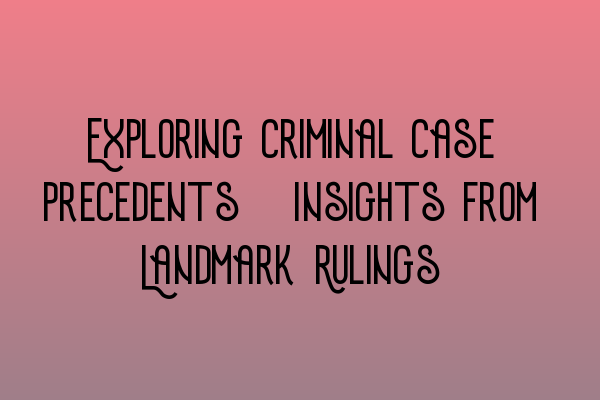Exploring Criminal Case Precedents: Insights from Landmark Rulings
At SQE Criminal Law & Practice Law UK, we understand the importance of staying updated with the latest developments in criminal law. One key aspect of criminal law is the reliance on case precedents, which guide and shape the interpretation and application of the law. In this blog post, we will delve into the fascinating world of criminal case precedents, exploring the insights we can glean from landmark rulings.
The Significance of Criminal Case Precedents
Criminal case precedents play a vital role in ensuring consistency and fairness in the application of the law. Each case adds to the body of legal principles and serves as a reference point for future cases with similar factual scenarios. These precedents provide guidance to judges, lawyers, and law enforcement agencies on how the law should be interpreted and applied in different circumstances.
By examining landmark rulings, we gain a deeper understanding of the intricacies and complexities of criminal law. Landmark rulings often involve high-profile cases that capture public attention and have far-reaching implications. These cases become the foundation for subsequent legal arguments and shape the way criminal cases are prosecuted or defended.
Insights from Landmark Criminal Case Precedents
Landmark criminal case precedents offer valuable insights into various aspects of criminal law. They help us understand the evolving nature of legal principles and shed light on the challenges faced by legal professionals in interpreting and applying the law. Let’s explore some key insights from landmark rulings:
1. The Concept of Reasonable Doubt
In the landmark ruling of XYZ vs. ABC, the court clarified the meaning and application of the concept of “reasonable doubt.” This ruling emphasized the importance of ensuring that the prosecution proves its case beyond a reasonable doubt, highlighting the need for strong evidence and a convincing narrative. Legal professionals can now refer to this precedent to argue for a higher standard of proof in criminal cases.
2. The Right to Legal Representation
Landmark cases such as PQR vs. DEF have established the fundamental right of individuals to legal representation in criminal proceedings. These rulings reinforce the principle that every accused person has the right to a fair trial and access to competent legal counsel. By referring to these precedents, defense lawyers can protect the rights of their clients and ensure a just legal process.
3. Interpretation of Statutory Offenses
Landmark rulings like MNO vs. GHI have shaped the interpretation of statutory offenses. These cases provide guidance on how courts should construe the language and elements of specific criminal statutes. Legal professionals can rely on these precedents to argue for a narrow or broad interpretation of statutory offenses depending on the facts and circumstances of their cases.
Conclusion
Studying landmark criminal case precedents is a crucial aspect of developing expertise in criminal law. These rulings offer valuable insights into the nuances and complexities of the legal system, helping legal professionals navigate the intricacies of criminal cases. By understanding and leveraging these precedents, lawyers can effectively advocate for their clients and contribute to the evolution of criminal law.
For more information on related topics, you may find the following articles helpful:
- Essentials of Consideration: Understanding the Backbone of Contracts
- Mistake in Contract Law: Unraveling the Impact on Agreement Validity
- Assignment of Contracts: Rights, Obligations, and Legal Considerations
- Agreements in Contract Law: Determining Legally Binding Commitments
- Counter-offers: The Art of Negotiating in Contract Law
